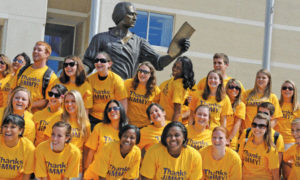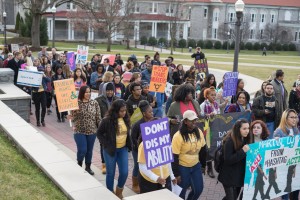What kind of leader are you? I recently chaired a search committee for an administrative position and it was one of the things we asked candidates—for obvious reasons. Really, what committees want to know with this question is, How will you motivate people, manage them, get them to do stuff? Nearly every candidate used the word ‘collaborative.’ I hear that word used so often these days, thrown around in meetings and casual conversation, that it has become a cliché. So I set out to do a little reading on leadership styles to see where ‘collaborative’ came from, what it meant, and what it meant for me as a leader, if anything.
Category Archives: Higher Ed Life
Selling Gen Z on GenEd
Every year, JMU’s more than 80 First Year Advisors have a full day of professional development to prepare for the summer registration of more than 4600 freshmen. This year, I offered some updates about the General Education program followed by these remarks:
I’m often asked by advisors, “How can we talk about the value of JMU’s General Education program in a way that seems persuasive and authentic for this population, Generation Z, at this moment in time?” Yesterday’s IHE featured an op-ed by Roger Continue reading
Summer’s Never Off
If one more person says to me, “So, enjoying your summer off?,” I’m gonna scream. True, the number of classes in session is fewer, the number of students on campus has dropped, and the number of meetings has dwindled. Yet June and July are busy months for those of us who oversee general education programs at public universities.
 Our unit, University Programs, manages the enrollment of all first year students–at present, we expect more than 4,600 freshmen and about 650 transfers (we use the term Firstyears for both populations). That many bodies requires a lot of seats! In the past, we assumed an average of 4.2 general education classes per freshman to make a full-time schedule of 12-15 credits. Today, I Continue reading
Our unit, University Programs, manages the enrollment of all first year students–at present, we expect more than 4,600 freshmen and about 650 transfers (we use the term Firstyears for both populations). That many bodies requires a lot of seats! In the past, we assumed an average of 4.2 general education classes per freshman to make a full-time schedule of 12-15 credits. Today, I Continue reading
5 #AcWri Tips for Administrators
Now that my latest book is out, people want to know how I found the time to write it. When your days are full of meetings, plus you teach every semester, plus you have a family that includes a tween and a teen, well, you need a plan. I admit that the way I went about producing Race, Place, and Memory differed significantly from the strategy I used for my previous publications, written when I was a tenure-track assistant professor. In fact, my advice won’t work for everyone who holds an administrative role, Continue reading
Composing a Life
When I first came to JMU, I entered a new phase of life: new job as a dual professor-administrator, mother to a new baby (my second), and a new decade (I turned forty soon after I arrived). A few months in, a colleague gave me a copy of Mary Catherine Bateson’s Composing a Life. I think she knew how much I would appreciate Bateson’s topic:
“This book is about life as an improvisatory art, about the ways we combine familiar and unfamiliar components in response to new situations, following an underlying grammar and an evolving aesthetic.”
In the decade since, I have changed administrative roles twice, completed a variety of big-multi-year projects, and turned fifty. I picked Bateson’s book up again this spring. It Continue reading
Liberty and Learning at JMU
Here is a guest post I wrote for the American Democracy Project at the American Association of State Colleges and Universities, July 2017

The James Madison statue on East Campus (“Big Jimmy”) is a popular spot for photographs, especially on Constitution Day. Photo courtesy JMU Marketing and Communications.
We take civic engagement very seriously at James Madison University. Originally founded as the State Normal and Industrial School for Women in 1908, this institution has been renamed and rebranded multiple times. President Samuel Page Duke proposed the name Madison College in 1938 in part to commemorate the legacy of the nation’s so-called “Forgotten Founder,” and President Ronald Carrier led the Continue reading
Fixing #TradCiz (Traditional Citizenship) with #DigCiz and #Civictech

JMU students hold a commemorative march and speak out every MLK Day. Signs this year featured hashtags, some for actual online conversations, some for imagined ones. Both suggest an emergent mindset regarding social media and political or democratic engagement.
This summer, I have been participating in a #DigCiz conversation that is helping me think more carefully about the relationship between activities in the digital world, especially social media, and activities in the analog world, especially in the American political system. In a recent Tweet, I referred to the nexus between #DigCiz and #TradCiz (Traditional Citizenship) (I think I made #TradCiz up. If not, please let me know). Part of this nexus includes what is called “civictech,” a term used in civic-engagement-in-higher-ed conversations to reference a host of Continue reading
Mapping My Place in the Open Landscape
Maybe it’s all the cultural geography I’ve read, but I find the idea of mapping my place in the landscape of open learning very intriguing. Am I digital visitor or a resident? In my forthcoming book, I explore (among other things) the way cognitive mapping works to help people navigate their place in the cultural landscape of a community; I’m especially interested in the way that our attachments to physical places serve as mnemonics for experiences or events (both positive and negative) crucial to identity formation, especially civic and racial identities. Among other things, I consider the way parades function—a group of people processing deliberately by iconic buildings and monuments serves to inscribe shared values on the landscape but also works to unite the marchers Continue reading
Quads as Symbols of Liberal Learning
We recently ended Springboard, a series of thirteen days in June and July that are designed to welcome freshmen to campus and provide a key part of their orientation programming. Organized by our Orientation Office in conjunction with Admissions, the advising centers, the academic colleges, and my unit, University Programs, it affords my colleagues and me an opportunity to talk directly to students and their parents about academic expectations here and the value of a liberal education. I only get ten minutes, so I try to make it count by focusing on a few “mental images” as takeaways.
Here’s what I said: Continue reading
